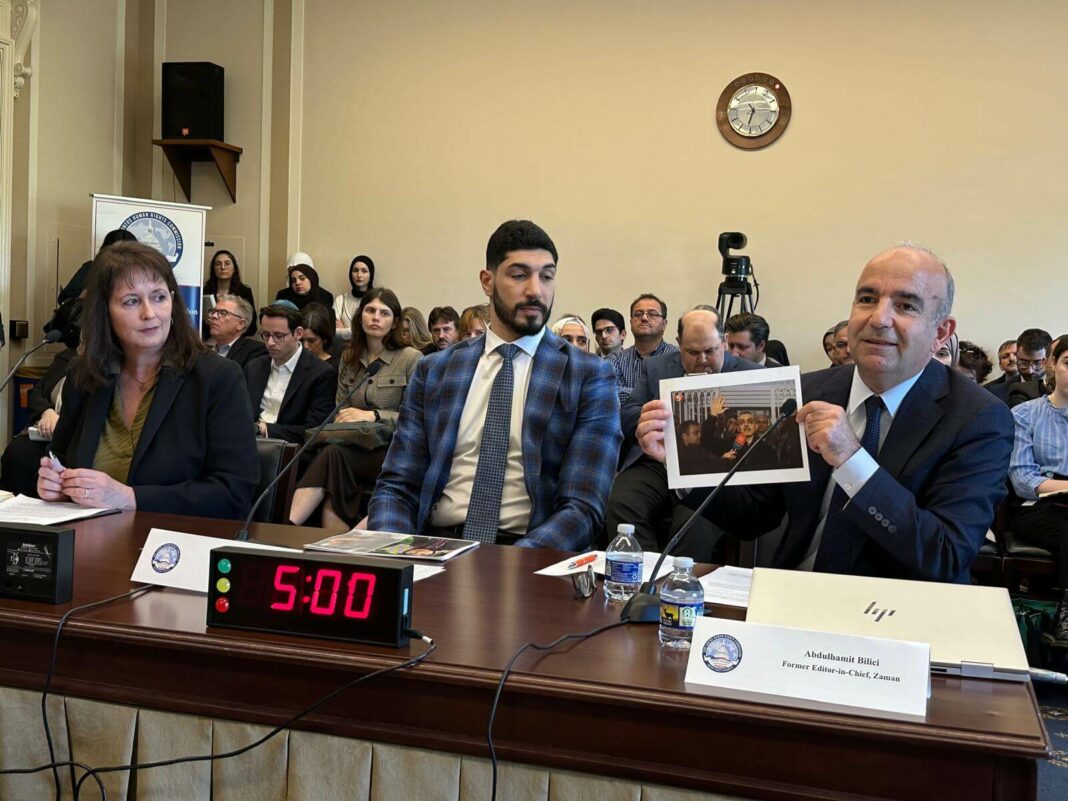The Tom Lantos Human Rights Commission, a bipartisan body within the US House of Representatives, held a hearing on Tuesday to address the human rights situation in Turkey and heard testimony by several well-known government critics living in exile, the Stockholm Center for Freedom reported.
Hosted by Representatives Christopher Smith (R-NJ) and James McGovern (D-MA), the event featured as witnesses Enes Kanter Freedom, a former NBA basketball player and human rights activist; Abdulhamit Bilici, the former editor-in-chief of the now-closed Zaman daily; and Nadine Maenza, the president of the Washington, D.C.,-based International Religious Freedom (IRF) Secretariat.
“Regrettably, human rights violations in Turkey have escalated significantly, turning what was once a model into a problematic country,” said Kanter in his remarks, citing several international rankings such as Reporters Without Borders’ (RSF) Press Freedom Index, where Turkey was ranked 165th out of 180 countries in 2023, and the Rule of Law Index by the World Justice Project (WJP), in which it was ranked 117th among 142 countries.
Kanter went on to talk about the Turkish government’s widespread crackdown on the Gülen movement, a faith-based group accused by the authorities of “terrorist activities.”
“Since the 2016 failed coup attempt, authorities have dismissed or suspended tens of thousands of civil servants and government workers, including more than 60,000 police and military personnel, and more than 4,000 judges and prosecutors,” he said. “They have also arrested or imprisoned more than 95,000 citizens and closed more than 1,500 nongovernmental organizations on terrorism-related grounds, including hundreds of highly successful math and science academies, universities and media outlets, primarily for alleged ties to the movement of cleric Fethullah Gülen.”
Turkish President Recep Tayyip Erdoğan has been targeting followers of the Gülen movement, inspired by Turkish Muslim cleric Gülen, since the 2013 corruption investigations, which implicated then-prime minister Erdoğan, his family members and his inner circle.
Dismissing the investigations as a Gülenist coup and conspiracy against his government, Erdoğan designated the movement as a terrorist organization and began to target its members. He intensified the crackdown on the movement following the abortive putsch in 2016 that he accused Gülen of masterminding. Gülen and the movement strongly deny involvement in the coup attempt or any terrorist activity.
Kanter also addressed the government’s transnational repression, stating that the Turkish government was behind the forcible abduction and rendition of more than 100 citizens from around the world.
He went on to describe how he became a victim of transnational repression. “In nine years, I received 12 arrest warrants and countless death threats. They tried to attack me in front of a mosque in Boston, ran social media campaigns against me and pressured American universities, NGOs and political groups to cancel their events with me. During a 2017 visit to Indonesia, I was nearly kidnapped by local government officials with the intention to send me back to Turkey. With the help of a good local officer, I was able to leave the country immediately. Later that year, I narrowly escaped from police officers at the Romanian airport whom the Turkish government had sent after me. They attempted to arrest me and send me back to Turkey. Thankfully, Senator [James] Lankford intervened and helped me return to the US.”
“While my story is well-known, millions of people out there have stories or voices that are not heard, especially the stories of innocent political prisoners,” he said. “Prison conditions remain alarming, with overcapacity, torture cases and inadequate investigations. Torture and ill-treatment extend beyond detention centers, affecting thousands.”
“Turkish prisons are full of educators, academics, journalists, housewives with babies and elderly, very ill people. So many families are separated, and so many children are left with no parents near them.”
Kanter urged the US Congress to “take bolder steps” and prioritize human rights in dealing with the Turkish government.
Journalist Bilici described how Turkey’s gradual descent into authoritarianism brought about increased pressure on his newspaper, Zaman, which was first seized and later shut down by the authorities over its criticism.
He showed commission members footage of the police raid on the headquarters of the daily, which used to be the most highly circulated newspaper in the country.
Bilici later told individual stories of some of the prominent victims of Turkey’s crackdown on dissent, such as media executive Hidayet Karaca, lawyer Can Atalay and Kurdish politician Selahattin Demirtaş, all imprisoned on political grounds.
IRF President Maenza described the discrimination and pressures facing Turkey’s religious minorities, such as Christians, Syriacs and Alevis, which involve the expropriation of property and denial of legal recognition for the Halki Orthodox Seminary and cemevis, Alevi places of worship.
Maenza also addressed the increase in hate speech against the refugee communities in Turkey in recent years as well as a crackdown on the Kurdish political movement, including a recent controversy where local election authorities attempted to deny a mandate to assume office to a Kurdish politician elected mayor in the eastern province of Van, leading to widespread protests across Kurdish-majority provinces.
She also referred to Turkey’s airstrikes on Kurdish-held areas in northern Syria that allegedly targeted civilian infrastructure, causing humanitarian crises in the region.

